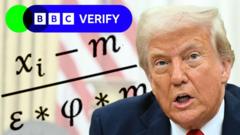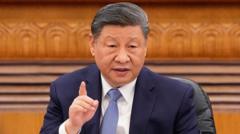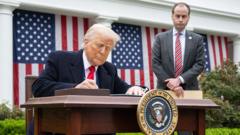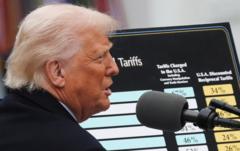World leaders are voicing their concerns regarding President Trump's newly imposed tariffs, which are anticipated to have serious ramifications for the global economy.
Global Leaders Express Strong Opposition to Trump's New Tariffs

Global Leaders Express Strong Opposition to Trump's New Tariffs
World leaders unite against US tariffs, warning of devastating economic impact
European Commission President Ursula von der Leyen has labeled President Donald Trump's decision to implement new tariffs on all goods entering the United States as a "major blow to the world economy." Following Trump's announcement of a blanket 10% tariff on imports effective April 5, various countries, including China, have reacted critically, warning that they will enact "resolute countermeasures" in response.
Trump argues that these tariffs serve as a necessary corrective to what he perceives as unfair global trade practices, claiming his policies aim to rekindle American manufacturing and prosperity. However, von der Leyen cautioned that such measures will incite "spiraling uncertainty," leading to dire consequences for millions worldwide, especially in vulnerable countries facing some of the highest tariffs. She further emphasized that Europe will adopt a collective stance, preparing countermeasures should discussions fail.
Among European leaders, Italy's Giorgia Meloni, a Trump supporter, acknowledged the decision as "wrong" yet pushed for negotiations to avert a potential trade war. Spanish Prime Minister Pedro Sánchez affirmed Spain's dedication to an open market approach, while Ireland's Taoiseach Micheál Martin echoed von der Leyen's sentiments, declaring the tariffs "deeply regrettable." France's President Emmanuel Macron described the decision as "brutal and unfounded," predicting a detrimental impact on both the European and US economies.
Beyond Europe, China has emerged as the most affected nation, facing a staggering 34% additional tariff on its goods. In an emphatic statement, the commerce ministry urged the U.S. to abolish these tariffs, vowing to safeguard its own economic interests. Other nations including Taiwan and South Korea expressed their disappointment, with South Korea's acting President acknowledging the looming reality of a global trade war.
Australia's Prime Minister Anthony Albanese cautioned that ordinary Americans would ultimately bear the economic brunt of the tariffs, asserting his country would not escalate the situation with retaliatory measures. The UK, meanwhile, is preparing a list of potential tariffs against US products, signaling a readiness to respond tactically.
In Latin America, Brazil's government has passed legislation aimed at counteracting the tariffs, while Canadian officials maintain that the economic landscape for Canadians will be dramatically altered, despite Canada being left unmentioned in Trump's initial announcements.
The White House's stance remains unapologetic, warning affected countries against retaliation, signaling a tense atmosphere as nations brace for what could become a full-fledged trade conflict.





















